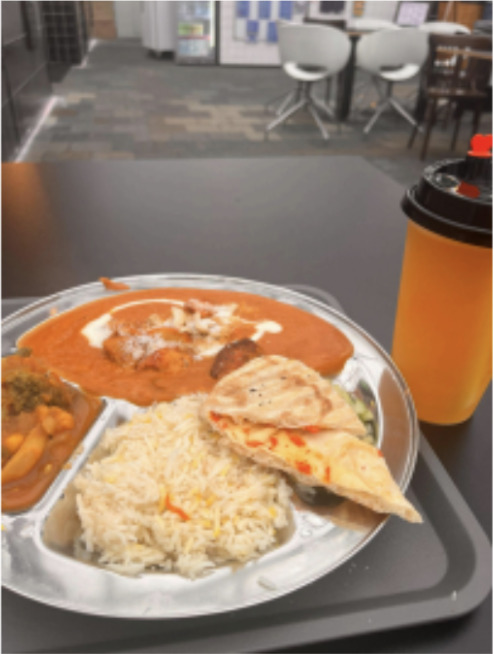#indian grocery in germany
Text

Indian Grocery in Germany - Authentic & Affordable
Indulge in the genuine tastes of India while in Germany at spicevillage.eu. Discover a wide selection of authentic Indian goods at spicevillage.eu. Start shopping now!
Indian Grocery In Germany
0 notes
Text
reconsidering my desire to move to europe because there’s no spicy food and nobody is capable of good asian cuisine
#asian in general#actually germany was ok at indian#but wow. italy cannot do chinese#and NOTHING has spice here i’m dying#the grocery doesn’t even carry what i would need to cook it myself#text
3 notes
·
View notes
Text
MR. SABJI: Germany's Best Indian Grocery Online Store

German demand for Indian foods has increased due to convenience and accessibility. People of many backgrounds are enjoying Indian cuisine's unique flavors. You need a reliable Indian online grocery store in Germany whether you're a seasoned cook or a culinary explorer. You can trust MR. SABJI for the best Indian grocery online store.
#Asian grocery#Indian grocery online#Online Indian grocery#Indian grocery near me#Asian grocery online store#South Indian grocery store#Indian online supermarket#South Indian grocery online#Indian Supermarket near me#Indian online grocery Germany#Best Indian Grocery online store
0 notes
Text

Desigros is the largest online Indian grocery store in Germany. Here, you can buy the best items at a very affordable price. For more details, visit now.
0 notes
Note
the thing about “secret israeli restaurants” is americans are generally more positive to israelis than arabs so a vague restaurant is more likely to be hiding arab origins than israeli
pretty sure the og tweet poster was Canadian but yeahhhhh I read it and blinked about the antisemitism but I also read it and blinked about the fact that like bro… are you…. are you that fucking unaware about the extent of anti-Arab and anti-middle eastern racism in the us&canada? Are you that fucking obtuse? Oh my god. It literally doesn’t fucking matter what “origins” the restaurants are “hinting at” but I couldn’t fucking process how a white Canadian would think that “people who simply describe themselves/their business establishment as “middle eastern” or “Mediterranean” are inherently sketchy” is in any way a productive idea to have for literally anyone
a) a restaurant/establishment describing themselves as “Mediterranean” or “middle eastern” would be inherently sketchy and suspicious (as loaded as “middle eastern” itself is, “Mediterranean” can often be taken more positively in the west and anglophone/francophone worlds, after all nutritionists have been going on about the “Mediterranean diet) for a while) but also
B) that those people would inherently be (in his opinion) Zionists and/or Israelis
also feel this person has big “have never interacted with middle eastern person in my life” because as much as xenophobia and various other issues pushes people to go for either the “Mediterranean/middle eastern” marker, there’s plenty of other reasons why establishments go for those identifiers like.
1) a lottttt of Mediterranean diaspora families, due to immigration and intermarriage, really are franco-lebanese, or palestinain-Greek, or Ashkenazi Jewish and Algerian, or Moroccan Spaniards, or something like that, (check the Arabs, Jews, and Italians of the greater nyc area lol) and
2) in diasporic situations one (1) grocery store or deli often services OR competes with others for a broader market share, I’ve lived places where I regularly shopped at a Turkish/greek/arab grocery store (Labelled itself “Mediterranean”) and a Persian/armenian/arab grocery store (Labelled itself “middle eastern groceries”) because it would be dishonest to say that these grocery stores are for any one “nationality!” Walk into many a Mediterranean or middle eastern grocery store or deli and you’ll see Turkish products from Germany, maghrebi Jewish products from France, halal versions of jamón and chorizo, and labneh from lebanon next to Greek and Persian yogurt. My favorite local market once had an entire NOT HALAL!!!!! Fridge Labelled in three languages to store the frozen pork products for the Greek and Romanian markets next to the general halal cheese boreks.
I’m not saying this is the case everywhere or like it’s all peachy perfect in diaspora but this just comes across as someone who has a lot of political Ideas about Mediterranean & middle eastern people but haven’t met them in real life. Also it’s a love letter to the diaspora grocery store with 6+ ethnicities inside them and an entire wall of tomato pastes. If there’s one in your city you should patronize them! (Also note the fantastic phenomenon of the “Black Sea” grocery, the mass halal Mart, and the particular greater London “Indian Bangladeshi Sri Lankan Persian Pakistani polish” mart
Also lol gonna have to lol at the “I’m so angry these diaspora Israelis would hide their nationality in order to avoid harassment because I want to boycott and harass them”
#That post#Also yeah that post was so stupid but it could get people killed#So idk#Racism#it’s so. I want to bang my fucking head into the wall
48 notes
·
View notes
Text
Cost of Living in Germany for Indian Students
Overview
For Indian students, the cost of living in Germany is quite reasonable, especially considering the high quality of life and world-class education available. On average, students can expect to spend around €800 to €1,000 per month, which covers accommodation, food, health insurance, transportation, and other essentials. Rent is typically the largest expense, but shared apartments (WG) and student dormitories offer more affordable options. Additionally, students benefit from numerous discounts on public transport, cultural events, and leisure activities, helping to keep expenses manageable. Many Indian students also take advantage of part-time work opportunities to supplement their income while studying.
University Tuition Fees
Germany is renowned for offering high-quality education with surprisingly low tuition fees, making it an attractive destination for students worldwide. Most public universities in Germany do not charge tuition fees for undergraduate and many Master’s programs, including for international students. Instead, students pay a nominal semester fee, which typically ranges between €150 to €350, and often includes public transportation and student services. For those attending private universities, tuition fees are still competitively priced compared to other countries, offering excellent value for the level of education provided.
Accommodation in Germany
Finding accommodation in Germany as a student is a straightforward process, with a variety of options to suit different needs and budgets. Students can choose from university dormitories, shared apartments (WG), or private rentals. University dormitories are often the most affordable, providing a convenient and social living environment close to campus. Shared apartments are popular among students, offering a balance between cost and independence, with the added benefit of living with fellow students. Private rentals are available for those seeking more privacy or specific amenities, though they tend to be more expensive.
Food Expense in Germany
In Germany, food expenses can vary significantly depending on lifestyle and dietary preferences. On average, a single person might spend between €150 to €300 per month on groceries. Prices for basic items like bread, milk, and fresh produce are relatively affordable, with supermarkets such as Aldi, Lidl, and Edeka offering a range of budget-friendly options. Dining out is generally more expensive, with meals at mid-range restaurants costing around €10 to €20 per person. In larger cities, food costs tend to be higher, particularly in trendy or tourist-heavy areas. Overall, Germany offers a wide range of choices to suit different budgets.
Health Insurance in Germany
Health insurance in Germany is mandatory for all residents, ensuring comprehensive healthcare coverage. The system is divided into two main types: statutory health insurance (Gesetzliche Krankenversicherung, GKV) and private health insurance (Private Krankenversicherung, PKV). About 90% of the population is covered under the GKV, which is publicly funded and managed by non-profit health insurance funds. Contributions are income-based, with both employers and employees sharing the cost. The GKV provides access to a wide range of medical services, including doctor visits, hospital stays, and prescription medications. PKV, on the other hand, is typically chosen by higher-income earners, the self-employed, and civil servants, offering more tailored services and shorter waiting times, but at a potentially higher cost. The German healthcare system is known for its high quality, ensuring that all residents receive necessary medical care.
Conclusion
The cost of living in Germany for Indian students is generally affordable compared to other Western European countries, but it can vary based on location and lifestyle. On average, students may need around €800 to €1,200 per month to cover expenses, including rent, food, transportation, health insurance, and personal costs. Cities like Munich and Frankfurt are more expensive, while smaller cities and towns offer a lower cost of living. Affordable public transportation, student discounts, and part-time job opportunities help manage expenses.
0 notes
Text
Netherlands, University of Groningen - Nya Caballero
1. What was your favorite part about the Netherlands?
How peaceful it was for me; I grew up in The Bronx, the opposite of the Netherlands. I enjoyed the peace in the Netherlands and being able to do certain things I could not do at home. Groningen is a small city, and I did not bike, but it is very walkable, and I would often take walks or even walk to the city center. The city center had many clothing stores and restaurants, so there were always options if you ever wanted to try something options. I also enjoyed learning and meeting new people within the University.

2. Describe a day in the life of a student in the Netherlands.
My day typically started around 10 am; I would eat breakfast and take the bus to class. Bus I lived around 10 minutes away from my campus; most people ride bikes in the Netherlands, but I was very anxious riding my bike. As soon as I got off the bus, the campus was right there, so it was a little bit of a walk. Classes in the Netherlands are typically around 2 hours, with a 15-minute break after an hour. In the classes, students clap at the end of each lecture. After finishing my lectures, I would grab lunch at the cafe with many options. I mainly got Indian food, which was always around 10 euros- 15 euros, depending on what you got. After classes, I would return to my room, read for my classes, and update my study guides. I would read until 10 pm-11 pm and each dinner. My dinner was typically sandwiches, or I would order food since I would need more time to cook.

3. What were your accommodations like?
In the Netherlands, there are no dorms like in Geneseo. They have a housing company called SSH, which offers different accommodations. My accommodation is like an apartment, but you share a kitchen. I liked my accommodation since it was pretty modern and the room was huge. Most of the other students on my floor were studying aboard as well. I lived and shared a floor with other Geneseo students, making me more comfortable. I was close to campus, and the local grocery store was a 2-minute bike ride and a 10-minute walk.
4. Did you travel while aboard in the Netherlands?
I made two trips during my travels here: Paris, France, and Hamburg, Germany. I enjoyed both trips but loved Germany the most. It was pretty scary traveling, but it was super easy. The Netherlands has a bus called Flixbus that takes you to different countries. My bus trip to Germany was a 40-euro round trip, a 4-hour bus ride. On my trip to Paris, I took a slightly more expensive flight; it was 220 euros round trip. I saw many museums and tried different food places, and it was really fun even though I went solo.


5. Why did you decide to study abroad, specifically the Netherlands?
I decided to study abroad because it was my last semester of college, and I wanted to travel before I graduated. The Netherlands program was the only program that allowed me to return in time for my graduation. However, I did not choose this program because of its convenience. I heard positive things about the program, and it looked like a beautiful country to be in. I also wanted to learn something new as well since I am originally a Sociomedical Science major in Geneseo; during my time aboard, I studied Psychology.
0 notes
Text
Cost of Studying Abroad for Indian Students in Rupees

Studying abroad is a dream for many Indian students, but the financial aspect can often seem daunting. From tuition fees to living expenses, there are several factors to consider when calculating the cost of study abroad overseas. In this article, we'll break down the expenses involved and provide an estimate in Indian rupees to help you plan better for your academic journey abroad.
Tuition Fees: Tuition fees vary greatly depending on the country, university, and course you choose. For instance, studying in the United States or the United Kingdom tends to be more expensive compared to countries like Germany or Canada. On average, undergraduate courses can range from ₹10 lakhs to ₹40 lakhs per year, while postgraduate courses may cost between ₹12 lakhs to ₹50 lakhs per year.
Accommodation: Living expenses, including accommodation, can significantly impact your budget. The cost of accommodation varies based on factors such as location, type of accommodation (dormitory, shared apartment, or private rental), and amenities provided. In popular student destinations like the UK or Australia, monthly rent can range from ₹30,000 to ₹80,000, while in countries like Germany or Canada, it may be slightly lower, ranging from ₹20,000 to ₹60,000 per month.
Food and Daily Expenses: Food expenses depend on your lifestyle and dietary preferences. Eating out frequently or opting for groceries and cooking at home can affect your monthly budget. On average, students may spend between ₹15,000 to ₹30,000 per month on food and daily expenses, including transportation, utilities, and leisure activities.
Health Insurance: Health insurance is mandatory for international students in many countries. The cost varies depending on the coverage and duration of the policy. In general, health insurance for students abroad can cost between ₹20,000 to ₹50,000 per year.
Travel Expenses: Travel expenses include airfare, visa fees, and other related costs. The price of airline tickets fluctuates based on the time of booking, airline, and destination. Visa fees also vary depending on the country you're applying to. On average, students may need to allocate between ₹50,000 to ₹1,50,000 for travel expenses.
Miscellaneous Expenses: Miscellaneous expenses include textbooks, study materials, visa application fees, and other unforeseen costs. While these expenses may not be as significant as tuition or accommodation, they can add up over time. It's advisable to budget an additional ₹50,000 to ₹1,00,000 for miscellaneous expenses.
When tallying up the total cost of studying abroad, it's essential to factor in currency exchange rates and inflation, which can affect the overall expenses. Additionally, scholarships, grants, and part-time job opportunities can help alleviate some of the financial burdens associated with studying overseas.
In conclusion, study abroad can be a life-changing experience, but it's essential to plan your finances meticulously to ensure a smooth transition. By understanding the various expenses involved and budgeting wisely, you can make your dream of studying abroad a reality without breaking the bank.
0 notes
Text
Cost Of Living In Germany For Indian Students
Studying In Germany
Studying in Germany offers a unique and enriching experience with its world-class education system, cutting-edge research opportunities, and vibrant cultural landscape. Renowned for its commitment to academic excellence, German universities provide a diverse range of programs, many of which are offered in English, attracting a global student community. The emphasis on practical skills, industry collaborations, and a strong focus on research ensures students receive a well-rounded education. Germany's rich history, modern infrastructure, and high quality of life contribute to a dynamic environment for personal and academic growth. Studying abroad in Germany not only opens doors to top-notch education but also exposes students to a global perspective in one of Europe's leading academic destinations.
Tuition Fees In Germany For International Students
Public University:
Public universities in Germany do not charge tuition fees for international students, including those from India. This applies to undergraduate programs, master's programs, and PhD programs at many state-funded universities. However, students may still be required to pay semester fees or administrative charges, which typically range from 100 to 500 euros per semester. it's advisable to check the specific regulations of the university and state where you plan to study.
Private University:
Private universities in Germany can vary widely depending on the institution, the program of study, and the level of the degree. Private universities in Germany tend to have higher tuition fees compared to public universities.
It's important to note that private universities often offer a range of scholarships, financial aid, and payment plans to support students. Additionally, living expenses such as accommodation, food, health insurance, and other personal costs should be taken into consideration when budgeting for studies in Germany.
Top 5 Tips To Save Money In Germany
Budgeting:
Create a monthly budget outlining your income and anticipated expenses.
Differentiate between essential expenses (rent, groceries, utilities) and non-essential ones (entertainment, dining out).
Student Discounts:
Take advantage of student discounts on public transportation, museums, cinemas, and other activities.
Look for special student deals on software, books, and other resources.
Accommodation:
Consider shared housing or student dormitories to save on rent.
Look for accommodation options away from the city center, as they are often more affordable.
Public Transportation:
Use public transportation instead of owning a car, as it is more cost-effective.
Purchase a semester or yearly public transportation pass for potential discounts.
Part-time Work:
Check local regulations to see if you are allowed to work part-time on your student visa.
Look for part-time jobs or internships that align with your studies.
Health Insurance:
Compare health insurance plans to find the most cost-effective option.
Consider getting liability insurance, which is often required and can be more affordable.
Language Skills
Improve your German language skills, as it may help you find better deals and navigate daily life more efficiently.
Travel Smart
Plan your travels in advance to get the best deals on transportation and accommodation.
0 notes
Text
Discovering Authentic Indian Groceries in Germany: A Modern Convenience
Germany has long been known for its rich cultural diversity, which is reflected in the country's culinary landscape. With a significant Indian diaspora and a growing number of locals developing a taste for Indian cuisine, the demand for authentic Indian groceries has surged. This trend has led to the rise of various Indian Grocery In Germany options, catering to both traditional and modern culinary needs. Whether you're an expat longing for a taste of home or a local enthusiast exploring new flavors, accessing Indian groceries in Germany has never been more convenient.

Convenience and Variety: The Rise of Indian Grocery In Germany
For those residing in Germany, finding authentic Indian ingredients can sometimes be a challenge. However, the increase in Indian Grocery In Germany stores has made it easier to access a wide range of products, from spices and lentils to ready-to-eat meals. These stores provide essential ingredients that are crucial for preparing traditional Indian dishes, ensuring that the vibrant flavors of India are just a shopping trip away. The availability of these products not only helps maintain cultural connections for the Indian community but also allows others to experiment with and enjoy Indian cuisine.
Indian Grocery Store Online Germany: A Modern Shopping Solution
With the advent of digital technology, the way people shop has dramatically changed. This change is evident in the grocery sector as well, with the rise of Indian Grocery Store Online Germany platforms. These online stores offer a vast selection of Indian groceries, making it easy for customers to shop from the comfort of their homes. Whether you're looking for specific spices, fresh produce, or specialty items, online grocery stores provide a comprehensive shopping experience that caters to all your culinary needs.
Benefits of Shopping at an Indian Grocery Store Online Germany
The convenience of shopping at an Indian Grocery Store Online Germany is unparalleled. These platforms offer several benefits, including:
· Wide Selection: Online stores typically have a broader range of products compared to physical stores, ensuring that you can find even the most obscure ingredients.
· Ease of Access: Shopping online eliminates the need to travel long distances to find an Indian grocery store, saving time and effort.
· Doorstep Delivery: Most online stores offer home delivery services, which is especially beneficial for those with busy schedules or mobility issues.
· Competitive Pricing: Online platforms often provide better deals and discounts, making it more affordable to purchase your favorite Indian groceries.
Ensuring Authenticity and Quality
One of the main concerns when shopping for groceries online is the authenticity and quality of the products. Reputable Indian Grocery Store Online Germany platforms take this seriously by sourcing their products directly from trusted suppliers. This ensures that customers receive high-quality, authentic ingredients that meet their culinary expectations. Additionally, these platforms often provide detailed product descriptions and customer reviews, helping shoppers make informed decisions.

Conclusion
The availability of Indian Grocery In Germany through both physical stores and online platforms has made it significantly easier for people to access authentic Indian ingredients. Whether you’re preparing a traditional meal or exploring new recipes, these resources ensure that you have everything you need at your fingertips. For a seamless shopping experience, consider visiting spicevillage.eu, a reliable source of high-quality Indian groceries. This modern convenience allows you to embrace the rich flavors of Indian cuisine, enhancing your culinary adventures in Germany.
Blog Source URL :-
0 notes
Text
Affordable Accommodation in Germany for Indian students

Moving to Germany for studies is an exciting venture, but finding affordable accommodation can be a daunting task, especially for Indian students. In this guide, we'll explore various housing options, budgeting tips, and resources to help you secure comfortable and economical living arrangements during your stay in Germany.For More Info Visit: Accommodation in Germany for Indian students Types of Accommodation:Student Dormitories (Studentenwohnheim): Student dormitories are a popular choice among international students due to their affordability and convenience. These facilities offer furnished rooms with shared amenities such as kitchens, bathrooms, and common areas. While availability may vary, applying through your university's student services or online portals like Studierendenwerk can help you secure a spot.
Shared Apartments (WG or Wohngemeinschaft): Sharing an apartment with roommates is another cost-effective option. By splitting rent and utilities, you can significantly reduce your housing expenses. Websites like WG-Gesucht and Facebook groups dedicated to housing listings are valuable resources for finding shared accommodation opportunities.
Private Rentals: Renting a private apartment or studio offers more autonomy but may come at a higher cost. Consider exploring rental listings on websites like ImmobilienScout24 and eBay Kleinanzeigen to find affordable options within your budget.
Budgeting Tips:Set a Budget: Determine how much you can afford to spend on accommodation each month, taking into account other expenses such as tuition fees, utilities, and groceries.
Consider Location: Opting for accommodations in smaller towns or suburbs can be more budget-friendly compared to major cities like Berlin or Munich.
Utilities Included: Look for rental listings that include utilities like water, electricity, and internet in the monthly rent to avoid unexpected expenses.
Cultural Considerations:Understanding Rental Contracts: Familiarize yourself with German rental regulations and lease agreements to ensure transparency and avoid any misunderstandings with landlords.
Respect House Rules: Be mindful of cultural norms and etiquettes, such as noise levels and cleanliness, to maintain harmonious relationships with your roommates or neighbors.
For More Info Visit: Study in Germany for Indian Students
Conclusion:Finding affordable accommodation in Germany as an Indian student is indeed possible with careful planning and research. By exploring various housing options, setting a budget, and embracing cultural differences, you can secure a comfortable living space that enhances your study abroad experience. Remember to leverage online resources, seek advice from university housing services, and engage with local communities to navigate the housing market effectively. With the right approach, you'll soon settle into your new home away from home in Germany.
0 notes
Text
Your Premier Asian and South Indian Grocery Online Store, MR. SABJI, Offers Authentic Flavors

Our South Indian grocery store is heaven for South Indian food lovers. We deliver fresh, authentic ingredients for South Indian cookery since we understand its distinct needs. We have everything for dosas, idlis, sambar, and coconut-based curries.
#Asian grocery#Indian grocery online#Online Indian grocery#Indian grocery near me#Asian grocery online store#South Indian grocery store#Indian online supermarket#South Indian grocery online#Indian Supermarket near me#Indian online grocery Germany#Best Indian Grocery online store
0 notes
Text

My Desigros is the leading website where you can shop all types of Indian grocery items on very affordable prices. We are an Online-Only store where you can place your orders with the comfort of your home. We pick and pack them for you on the same day and get them delivered to you in just one or two days.
0 notes
Text
Living Expenses in Germany for Indian students

As an Indian student planning to study in Germany, understanding the living expenses is crucial for effective financial planning. Germany offers high-quality education, but it's essential to be prepared for the associated costs. Let's delve into the various aspects of living expenses in Germany for Indian students.
For More Info Visit: Cost of Living in Germany for Indian Students
Cost of Accommodation:
Accommodation expenses constitute a significant portion of living costs. Depending on the city and type of accommodation, rent can vary. Student dormitories are the most affordable option, followed by shared apartments (WG) and private rentals. On average, expect to pay between €300 to €600 per month for accommodation, inclusive of utilities.
For More Info Visit: Accommodation in Germany for Indian students
Food and Groceries:
The cost of groceries in Germany is reasonable, especially if you shop at discount supermarkets like Aldi and Lidl. Cooking your meals can help save money compared to eating out. On average, a monthly grocery budget for a single person ranges from €150 to €250.
Transportation:
Germany has an efficient public transportation system, including buses, trams, trains, and metros. Many cities offer discounted student passes for public transport. Additionally, cycling is a popular and economical mode of transportation. Budget around €50 to €100 per month for transportation expenses.
Health Insurance:
Health insurance is mandatory for all students in Germany. While public health insurance is affordable, some opt for private insurance for additional coverage. Plan to allocate around €80 to €100 per month for health insurance premiums.
Miscellaneous Expenses:
Miscellaneous expenses include internet and phone bills, leisure activities, and occasional travel. Budget approximately €100 to €200 per month for these expenses, depending on your lifestyle and preferences.
Tips for Managing Expenses:
Create a Budget: Track your income and expenses to ensure you're staying within your budget.
Avail Student Discounts: Take advantage of student discounts offered on transportation, food, and entertainment.
For More Info Visit: Scholarships in Germany for Indian Students
Part-Time Work: Consider working part-time to supplement your income, but ensure it doesn't interfere with your studies.
For More Info Visit: Part time Jobs in Germany for Students
Conclusion:
Understanding and effectively managing living expenses is essential for Indian students studying in Germany. By budgeting wisely, exploring cost-saving opportunities, and making informed financial decisions, you can maintain a comfortable standard of living while pursuing your academic goals in Germany.
0 notes
Text
Cost of Living In Germany For Indian Students
The cost of living in Germany for Indian students varies depending on the city and lifestyle. On average, monthly expenses including accommodation, food, transportation, and other necessities range from €700 to €1000. Rent constitutes a significant portion of expenses, with shared accommodation or student dormitories being more affordable options. Cooking at home can help save money compared to dining out frequently. Additionally, public transportation offers convenient and relatively inexpensive options for getting around. Students can also benefit from discounts on cultural events, entertainment, and transportation with a valid student ID. Overall, while living costs in Germany may initially seem higher compared to India, the quality of life, educational opportunities, and access to various amenities make it a worthwhile investment in one's academic and personal development.
Type of Cost of Living in Germany
Certainly, here are some categories that comprise the cost of living in Germany:
Accommodation: This includes rent for housing, whether it's a shared apartment, student dormitory, or private accommodation.
Food and Groceries: Expenses for groceries purchased at supermarkets or local markets, as well as dining out at restaurants, cafes, or fast-food chains.
Transportation: Costs related to public transportation such as buses, trams, trains, and subway systems, as well as expenses for occasional taxi rides or bike rentals.
Healthcare: Mandatory health insurance premiums for students, covering basic medical services and emergencies.
Utilities: Monthly expenses for utilities like electricity, heating, water, internet, and sometimes garbage disposal.
Study Materials: Costs associated with textbooks, stationery, and other academic materials needed for coursework.
Personal Expenses: Miscellaneous expenses for clothing, toiletries, personal care items, and leisure activities.
Communication: Expenses for mobile phone plans, internet services, and possibly a landline phone if desired.
Travel and Leisure: Budget for recreational activities, travel within Germany or neighboring countries, cultural events, movies, and other entertainment options.
Miscellaneous: Any additional costs that may arise, such as banking fees, visa fees, or unexpected expenses.
Money-Saving Tips in Germany for Indian Students write in bullet points
Shared Accommodation: Opt for shared apartments (WG) or student dormitories to split rent costs with roommates, making housing more affordable.
Cooking at Home: Prepare meals at home rather than eating out frequently to save on food expenses. Explore local markets for fresh and affordable produce.
Student Discounts: Take advantage of student discounts available for public transportation, cultural events, museums, and entertainment venues with a valid student ID.
Second-Hand Shopping: Consider purchasing clothing, furniture, and household items from thrift stores, flea markets, or online platforms to save money.
Budgeting: Create a monthly budget to track expenses and prioritize spending on essential items, while cutting back on non-essential purchases.
Free Activities: Explore free or low-cost activities such as hiking, picnics in parks, attending university events, or joining student clubs for recreational opportunities.
Travel Smart: Use budget-friendly transportation options like regional trains or bus passes for travel within Germany, and plan trips in advance to take advantage of discounted fares.
Part-Time Work: Explore part-time job opportunities to supplement income, keeping in mind the restrictions on working hours for international students.
Energy Efficiency: Practice energy-saving habits such as turning off lights and appliances when not in use to reduce utility bills.
Banking Fees: Choose a student bank account with minimal or no fees for transactions and ATM withdrawals, and consider using online banking services to avoid additional charges.
Conclusion:
In conclusion, while the cost of living in Germany may initially seem daunting for Indian students, careful planning and budgeting can help manage expenses effectively. With prudent choices such as opting for shared accommodation, cooking at home, and taking advantage of student discounts, living costs can be significantly reduced. Additionally, embracing a frugal lifestyle, exploring free or low-cost activities, and considering part-time work opportunities can further alleviate financial strain. With responsible financial management and a willingness to adapt, students can thrive and succeed in Germany without compromising their academic pursuits or personal well-being.
0 notes
Text
Cost of MS in Engineering Management in Germany

Pursuing a Master's in Engineering Management (MS EM) in Germany is a strategic investment in both academic and professional growth. As you embark on this educational journey, it's essential to gain insights into the cost implications. In this blog, we explore the various aspects that contribute to the cost of an MS in Engineering Management in Germany.For More Info Visit: MBA in Germany for Indian students1. Tuition Fees:One of the notable advantages of studying in Germany is the relatively low or even nonexistent tuition fees, especially when compared to other popular study destinations. Many public universities in Germany, including those offering MS in Engineering Management programs, charge minimal tuition fees. Some private institutions may have higher tuition costs, but the overall expenses remain competitive.2. Semester Contribution:While tuition fees may be low, students are typically required to pay a semester contribution. This contribution covers expenses such as student services, public transportation, and sometimes even a nominal fee for a student union. The semester contribution varies among universities and can range from a few hundred to around a thousand euros per semester.For More Info Visit: MS in industrial engineering in Germany3. Cost of Living:The cost of living in Germany varies depending on the city and lifestyle. Larger cities like Munich or Frankfurt may have higher living costs than smaller towns. Monthly expenses include accommodation, food, transportation, health insurance, and miscellaneous costs. On average, students should budget between 800 and 1,200 euros per month to cover living expenses.For More Info Visit: Best University in Germany for MastersAccommodation: Renting accommodation, whether in student dormitories or private apartments, constitutes a significant portion of living expenses. Costs can range from 300 to 800 euros per month.Food: Grocery shopping and occasional dining out are part of the monthly budget. On average, students spend about 200 to 300 euros per month on food.Transportation: Public transportation is well-developed in Germany, and a monthly transportation pass may cost around 70 to 100 euros. Additional costs may be incurred for occasional travel.
0 notes